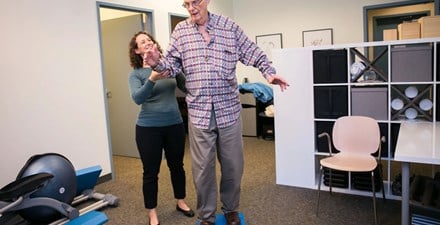
All physical therapists are qualified through higher education, clinical experience, and licensure to evaluate, diagnose, and treat a variety of symptoms and conditions. Many choose to focus their practice on a specific area or patient group and obtain advanced knowledge and experience in physical therapy specialty areas. Some attend residency programs, obtain board-certification, or go on to participate in fellowship programs. Learn more about these advanced learning pathways in physical therapy specialty areas.
Neurologic physical therapists evaluate and treat conditions caused by nervous system diseases or injuries. They care for people of all ages and work with them to improve their function and their ability to take part in daily activities.
Neurologic physical therapists provide care in many settings, including:
- Acute care hospitals.
- Inpatient rehab centers.
- Outpatient clinics and private practices.
- Skilled nursing and long-term care facilities.
- Schools.
- In the home and other community locations.
Neurologic physical therapists often provide evaluation and treatment for people with health conditions, such as:
- Balance, dizziness, and inner ear disorders.
- Conditions, such as cerebral palsy, spina bifida, and other genetic disorders.
- Stroke and incidents involving the brain and blood vessels.
- Tumors affecting the nervous system.
- Concussion and Traumatic brain injury.
- Parkinson disease.
- Multiple sclerosis.
- Amyotrophic lateral sclerosis.
- Acute or chronic conditions affecting the brain's signal to the arms and legs. Examples are Guillain-Barré and chronic inflammatory neuropathy.
- Spinal cord injury.
Looking for a physical therapist who focuses on or specializes in neurologic physical therapy or has experience treating people with neurologic conditions? The American Physical Therapy Association provides Find a PT to help you search for a physical therapist with these and other credentials near you.
Physical therapists are movement experts. They improve quality of life through hands-on care, patient education, and prescribed movement. You can see a physical therapist without a physician's referral for evaluation and treatment.*
Learn about board certification in neurologic physical therapy.
*Insurance and corporate policies or state laws may still require a physician's referral or limit treatment scope and duration without a referral. Insurance policies also may restrict you to in-network providers.


